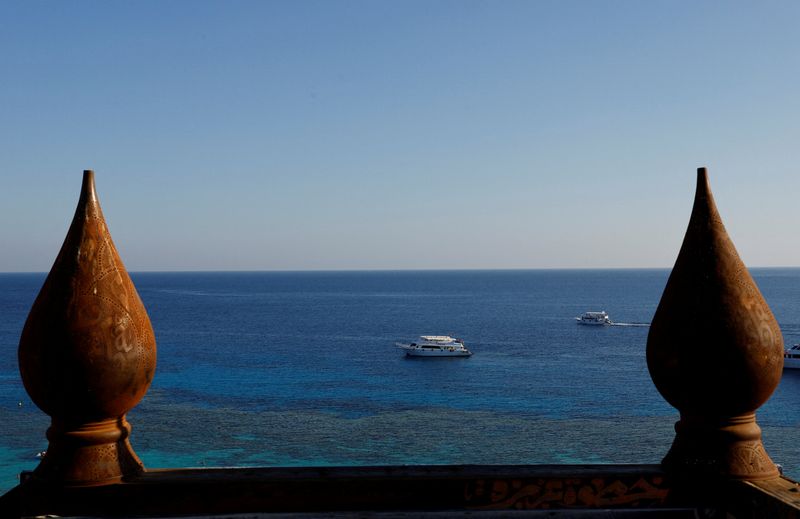By Aidan Lewis
CAIRO (Reuters) - Israeli and Palestinian officials agreed on Sunday to establish a mechanism to curb violence and incitement, in talks that stressed the need to prevent any disruptive actions at Jerusalem's holy sites when Ramadan starts later this week.
In a joint statement following talks in Egypt attended by U.S., Egyptian and Jordanian officials, the parties also reconfirmed commitments made at a meeting in Aqaba last month, including an Israeli pledge to stop discussion of any new settlement units for four months.
The Feb. 26 Aqaba meeting, the first of its kind in years, failed to halt violence on the ground despite Israeli and Palestinian pledges to de-escalate that were reiterated at Sunday's talks in the Egyptian resort of Sharm el-Sheikh.
Over the past year, Israeli forces have made thousands of arrests in the West Bank and killed more than 200 Palestinians, including fighters and civilians, while more than 40 Israelis and three Ukrainians have died in Palestinian attacks.
The Israeli-occupied West Bank has seen a surge of confrontations in recent months, with near-daily Israeli military raids and escalating violence by Jewish settlers, amid a spate of attacks by Palestinians.
At Sunday's talks Israeli and Palestinian officials "agreed to establish a mechanism to curb and counter violence, incitement and inflammatory statements and actions," which would report to a new meeting in Sharm el-Sheikh in April.
It did not give further details on the mechanism.
Parties to the talks also "emphasised the necessity of both Israelis and Palestinians to actively prevent any actions that would disrupt the sanctity" of Jerusalem's holy sites during the Muslim holy month of Ramadan, according to the joint statement.
In previous years Ramadan has occasionally seen clashes between Israeli police and Palestinians, particularly around Jerusalem's al-Aqsa Mosque compound, Islam's third holiest site, revered as the Temple Mount by Jews. Ramadan coincides this year with Judaism's Passover and Christian Easter.
On Sunday, a Palestinian gunman opened fire on an Israeli couple in their car in Huwara, wounding the man.
The incident had echoes of a similar attack in the same town during last month's Aqaba talks, when a gunman from the Hamas militant group killed two settlers in a car. Settlers responded to that attack by torching Palestinians' homes and cars, killing at least one Palestinian, a rampage a senior army commander called a "pogrom."
'DEFENDING RIGHTS'
Hamas, which governs the Gaza Strip, condemned the West Bank-based Palestinian Authority for taking part in Sunday's meeting attended by the Israeli government "which is escalating its aggression against our people."
Hussein Al-Sheikh of the umbrella Palestine Liberation Organisation said the Palestinian delegation was defending "the rights of our Palestinian people to freedom and independence, and to demand an end to this continuous Israeli aggression against us."
A senior Israeli official said parties had renewed their commitments to the understandings reached in Aqaba.
The Palestinians aim to establish an independent state in the West Bank and Gaza Strip with East Jerusalem as its capital, territories Israel captured in a 1967 war.
Peace talks have been stalled since 2014 and Palestinians say Israel has undermined their hope for a viable state by expanding Jewish settlements on occupied land.
Before the Aqaba talks last month, Prime Minister Benjamin Netanyahu's government had authorised nine Jewish settler outposts in the West Bank and announced mass construction of new homes in established settlements. The move drew deep dismay from the United States.
Israel pledged in Aqaba to halt discussions on new settlement units in the West Bank for four months and stop authorisation of outposts for six months.
But Netanyahu later appeared to downplay any commitment, saying there would be no freeze, in an apparent nod to far-right members of his coalition.
In Israel this month, U.S. Defense Secretary Lloyd Austin told Israeli leaders to reduce West Bank tensions. Washington was especially disturbed by settler violence against Palestinians, he said.

The White House welcomed the understandings reached on Sunday.
"We look forward to continuing these discussions as we enter the Holy month of Ramadan, Passover, and Easter, and over the months to follow," White House National Security Council spokesperson Adrienne Watson said in a statement.